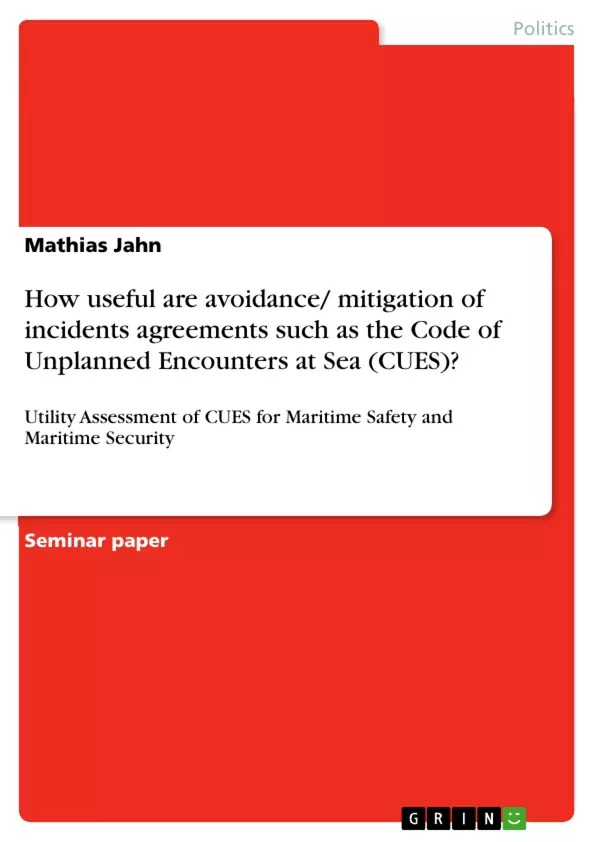How useful are avoidance/mitigation of incidents agreements such as the Code of Unplanned Encounters at Sea (CUES) in reducing the risks of conflict and building confidence in the Indo-Pacific waters?
The Indo-Pacific waters and, therein, the South China Sea (SCS) qualifies as the “center of gravity in global geopolitics”. Foremost due to its attributes as a disputed area of sovereignty/dominion, its rich flow/stock resources, and crucial sealines of communication for world trade. To peacefully manage SCS’s MARSAF and MARSEC , the literature suggests that over the past political/military leaders have built a profound framework of “Maritime Confidence-building Measures” (MCBM) to improve “awareness” and “governance” on a “strategic, operational and tactical” level. In particular, through the collaborative “security communities” concept (e.g., ASEAN, ADMM, ADMM Plus, WPNS, MMCA) and “legally binding and nonbinding instruments” (e.g., COLREG, UNCLOS, CUES).
In contrast, from 2010 to 2020, increased hegemonic Chinese military and grey zone activities as well as Vietnamese/Indonesian/Philippine/Thai (re)actions led to 73 deliberate ship rammings/ chasings/harassings among the parties. Between 2016 and 2018, China conducted 18 risky close-distance maneuvers toward U.S. naval vessels in the Pacific.
These numbers suggest a practical discrepancy, “compliance” shortfall, and “unsafe” behavior by the signatories (in particular by China), raising initial doubts about the utility of the MCBM framework to achieve its safety/security purposes.
To scope the essay to a workable set of SCS related research questions, it will examine to which extent the nonbinding CUES ('Independent Variable') did/will prove useful:
a) to increase MARSAF ('Antecedent Condition' on tactical and operational levels),
b) to (then) increase MARSEC ('Dependent Variable' on a strategic level)?
Table of Contents
- INTRODUCTION
- THE CONCEPTS OF MARSAF AND MARSEC
- UTILITY ASSESSMENT OF CUES FOR MARSAF
- Strengthening MARSAF on the operational and tactical levels
- Failing MARSAF on the operational and tactical levels
- Future Challenges
- UTILITY ASSESSMENT OF CUES FOR MARSEC
- Strengthening MARSEC on the political-strategic level
- Failing MARSEC on the political-strategic level
- Future Challenge
- CONCLUSION
Objectives and Key Themes
This essay aims to assess the utility of the Code of Unplanned Encounters at Sea (CUES) in reducing the risks of conflict and building confidence in the Indo-Pacific waters, specifically focusing on its impact on maritime safety (MARSAF) and maritime security (MARSEC). The essay explores the extent to which CUES, as a nonbinding agreement, contributes to strengthening or failing MARSAF and MARSEC in the contested South China Sea (SCS).
- The role of CUES in enhancing or hindering maritime safety (MARSAF) on operational and tactical levels.
- The impact of CUES on maritime security (MARSEC) at a political-strategic level.
- The practical challenges and limitations of CUES in achieving its objectives.
- The significance of maritime confidence-building measures (MCBM) in managing security in the Indo-Pacific region.
- The concept of "grey zone operations" and their impact on maritime safety and security.
Chapter Summaries
Chapter 2 delves into the conceptual distinctions between MARSAF and MARSEC, offering a definition of security in the maritime context and outlining the key values that these concepts encompass. The chapter connects these concepts to the initial research question, highlighting the importance of maintaining confidence in maritime security.
Chapter 3 explores the utility of CUES in relation to MARSAF. It examines how CUES aims to strengthen MARSAF on operational and tactical levels by promoting safety procedures and enhancing maritime awareness through collaborative efforts. The chapter also addresses potential limitations and challenges of CUES in effectively reducing maritime hazards in the SCS.
Chapter 4 focuses on the utility of CUES in relation to MARSEC. It examines the potential for CUES to strengthen MARSEC on a political-strategic level by providing a framework for collaboration and confidence building. The chapter also explores the limitations of CUES in influencing strategic decision-making and the broader dynamics of maritime security in the region.
Keywords
The essay primarily focuses on Maritime Safety (MARSAF), Maritime Security (MARSEC), the Code of Unplanned Encounters at Sea (CUES), and the South China Sea (SCS). It investigates the role of maritime confidence-building measures (MCBM), grey zone operations, and strategic brinkmanship in influencing maritime safety and security in the Indo-Pacific region. The essay also considers the practical implications of nonbinding agreements in achieving international cooperation and promoting a peaceful maritime environment.
Frequently Asked Questions
What is CUES in maritime security?
CUES stands for the Code for Unplanned Encounters at Sea, a nonbinding agreement designed to reduce the risk of incidents between navies at sea.
What is the difference between MARSAF and MARSEC?
MARSAF refers to maritime safety (preventing accidents), while MARSEC refers to maritime security (protection against intentional threats like conflict or piracy).
Is CUES effective in the South China Sea?
While it promotes safety procedures, its nonbinding nature leads to compliance shortfalls, especially during deliberate "grey zone" activities by major powers.
What are "grey zone operations"?
These are activities that fall between normal diplomacy and open warfare, such as ship rammings or harassments, used to assert sovereignty without starting a war.
How does CUES build maritime confidence?
It provides a standardized framework for communication and maneuvering, aiming to prevent misunderstandings during unexpected encounters between naval vessels.
- Quote paper
- Dr. phil. Mathias Jahn (Author), 2022, How useful are avoidance/ mitigation of incidents agreements such as the Code of Unplanned Encounters at Sea (CUES)?, Munich, GRIN Verlag, https://www.grin.com/document/1291683



